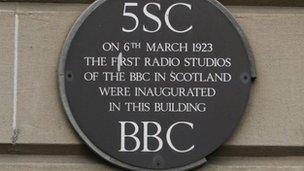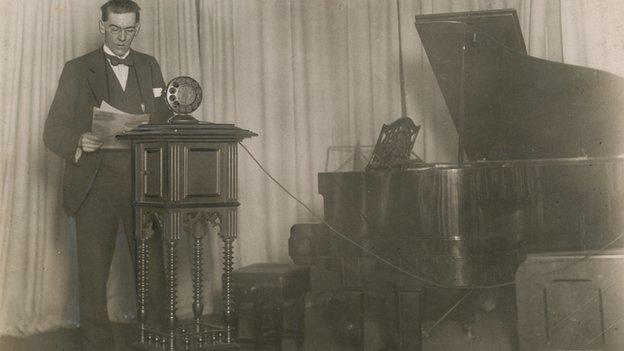90 years since BBC went on air in Scotland
- Published
In this 1984 BBC Scotland documentary "Scotland This Century: Pleasures of the People", Kathleen Garscadden recalls the early days of radio.
The BBC is celebrating 90 years of broadcasting in Scotland, with the anniversary of the first broadcast from the Glasgow radio station, 5SC.
On 6 March 1923, 5SC was the sixth BBC station to go on-air, following the establishment of stations in London, Birmingham, Manchester, Newcastle and Cardiff.
It broadcast from a small attic apartment at Rex House, 202 Bath Street, in what was then the city's thriving theatre and music hall district.
The building is still there today, with an office occupying what was once a small 'concert room'.
The only indication to passers-by of its pioneering history is a commemorative plaque on the outside of the building.

Plaque on the outside of Rex House commemorates the building’s place in history
The first radio broadcasts were primitive, yet highly ambitious for the time.
Technological constraints meant all programmes had to be performed live by local musicians and speakers.
Speaking to BBC Scotland in 1984, 5SC's organiser of children's and women's programmes, Kathleen Garscadden, recalled the spirit of the early days.
"It was great fun and, of course, very, very amateurish," she said.
"We just went out and bought [sheet] music every day for the programmes, put fairy tale books on the piano, seized a book and just read it."

5SC’s first station director, Herbert Carruthers, addresses the microphone in the Bath Street studios
"Everything was just done on the spur of the moment."
The first broadcast, at 7pm on Tuesday 6th March 1923, began with a pipe band playing the popular folk tune 'Hey, Johnnie Cope'.
John Reith, the BBC's general manager, then bent to the microphone and announced that 5SC, the Glasgow station of the British Broadcasting Company, was calling.
As a Scotsman, it was a proud moment for Reith, whose legacy of public service broadcasting remains with the BBC to this day.
Within weeks, 5SC was experimenting with 'simultaneous broadcasting' — the linking of radio stations throughout the country using the Post Office telephone network.
The ability to share programmes lessened the strain on local resources and, by the time additional stations were launched in Aberdeen, Edinburgh and Dundee, listeners were enjoying a significant amount of programming relayed from London.
Watch 'On View' one of the first TV broadcasts made by the BBC in Scotland, which first transmitted radio 90 years ago on 6 March 1923
It wasn't all one-way traffic: Scotland's first 'network production' — a dramatised production of Walter Scott's novel 'Rob Roy' — was the most ambitious radio drama so far attempted anywhere in Britain when it aired nationally on 6 October 1923.
Unable to reach many rural areas, the local stations were largely replaced in 1929 with a more efficient Scottish 'regional' service, which would be broadcast from higher-powered transmitters.
To this day, the BBC continues to address Scotland, for the most part, as a nation, with full-time local broadcasting the exclusive preserve of the commercial and community sectors.
In the intervening decades BBC Scotland has expanded into television and online services, and currently employs a staff of about 1,250, most of whom are based at its Pacific Quay headquarters in Glasgow.
It's a far cry from the dozen or so staff who ran a fledgling radio station from a city centre attic.